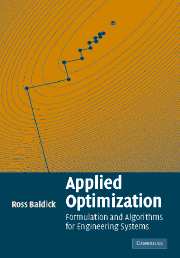Book contents
- Frontmatter
- Contents
- List of illustrations
- Preface
- 1 Introduction
- 2 Problems, algorithms, and solutions
- 3 Transformation of problems
- Part I Linear simultaneous equations
- Part II Non-linear simultaneous equations
- Part III Unconstrained optimization
- Part IV Equality-constrained optimization
- 12 Case studies
- 13 Algorithms for linear constraints
- 14 Algorithms for non-linear constraints
- Part V Inequality-constrained optimization
- References
- Index
12 - Case studies
Published online by Cambridge University Press: 03 December 2009
- Frontmatter
- Contents
- List of illustrations
- Preface
- 1 Introduction
- 2 Problems, algorithms, and solutions
- 3 Transformation of problems
- Part I Linear simultaneous equations
- Part II Non-linear simultaneous equations
- Part III Unconstrained optimization
- Part IV Equality-constrained optimization
- 12 Case studies
- 13 Algorithms for linear constraints
- 14 Algorithms for non-linear constraints
- Part V Inequality-constrained optimization
- References
- Index
Summary
In this chapter we will introduce two case studies:
production, at least-cost, of a commodity from machines, while meeting a total demand (Section 12.1), and
state estimation in an electric power system where the power injections at some of the buses are known to high accuracy (Section 12.2).
Both problems will turn out to be equality-constrained optimization problems. The first will introduce several new ideas in problem formulation, while the second will build on the state estimation case study from Section 9.2.
Least-cost production
Motivation
Consider a machine that makes a certain product, requiring some costly input to produce. In many industries it is possible to stock-pile the product at low cost from day to day, week to week, or even season to season. In this case, it is natural to try to operate the machine at constant output. Ideally, the constant value of machine output would be matched to either:
the point of maximum operating efficiency of the machine, or
some other desirable operating point of the machine.
When demand is lower than production, some of the production goes into the stockpile. When demand is higher than production, the stocks are used to help to meet demand.
However, if stock-piling is costly or inconvenient or if demand for the product varies rapidly, then to avoid over-supplies and shortages we have to vary production to follow variations in demand.
- Type
- Chapter
- Information
- Applied OptimizationFormulation and Algorithms for Engineering Systems, pp. 447 - 462Publisher: Cambridge University PressPrint publication year: 2006



